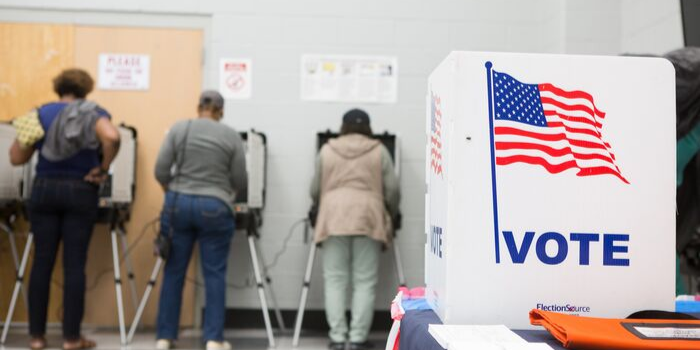
As the Voting Rights Act turns 54 this year, we lament the sixth anniversary of the Supreme Court’s Shelby County v. Holder decision. As we look ahead to the 2020 general election next year, we must continue the fight for our fundamental right and embrace our civic duty to vote. Let us reaffirm the values baked in this crucial legislation, which was drafted in the Religious Action Center’s very own library in 1965.
The Voting Rights Act helped block laws that deny citizens the equal right to vote based on race and enacted federal voting protections, especially in states with a history of discrimination in voting. But the 2013 Shelby 5-4 Court decision invalidated this crucial part of the law. In a statement, then-RAC director Rabbi David Saperstein expressed the RAC’s deep disappointment in how the decision, “effectively overturns the nation’s longstanding commitment to protecting the voting rights of all citizens.” The fear of this ruling’s impact became reality immediately and forcefully.
Just 24 hours after the release of the Shelby decision, Texas announced a plan to implement a strict photo ID requirement for voting. Since then, 21 states enacted new restrictive voting requirements and across 13 states, 1,688 polling sites have closed, which overwhelmingly impacts communities of color. The advocacy community fought back from the start, and courts have found intentional discrimination in at least 10 voting rights decisions since Shelby.
A legislative fix has been on the table since 2014 and the Reform Movement has supported the Voting Rights Advancement Act (VRAA) since its initial introduction. Reintroduced in the 116th Congress as H.R. 4 and S. 561, the VRAA would help prevent voter discrimination and increase transparency, restoring the original goal of the VRA to protect voters and their fundamental right. To get the VRAA enacted and to pass the kind of policies we support, we must vote. That is why we have also increased our efforts to ensure that voters understand the importance of registering to vote, voting, and organizing around issues in our communities with the Brit Olam cohorts.
We are guided by the teaching, “You shall not hide yourself,” (Deuteronomy 22:3), which Rashi interprets for us as meaning, “You must not cover your eyes, pretending not to see.” The Reform Movement will not hide, nor cover our eyes; rather, we will look at injustice around us and respond as engaged citizens, taking on the responsibility to participate in our democracy.
Within our own communities, the RAC has worked to ensure that every congregation and every vote count. Over a year ago, we revamped an organization-wide voter engagement campaign in advance of the 2018 midterms, engaging over 120,000 Americans and registering over 4,000 people to vote. Looking ahead to 2020, we are hoping to use our civic engagement campaign again to mobilize even more voters to register, pledge to vote, and show up to the polls.
We are eager to join our partners at the Poor People’s Campaign: A National Call for Moral Revival, co-chaired by Revs. William J. Barber II and Liz Theoharis, who recently launched a nationwide campaign to engage voters. The “We Must Do M.O.R.E.” tour, is a 9-month-long and 20-plus state direct campaign that seeks to Mobilize, Organize, Register, and Educate people who will vote.
Join the RAC and work with us to safeguard our democracy by restoring and embracing the vote. Urge Congress to take action to support the Voting Rights Advancement Act with the Religious Action Center by writing to your member of Congress. Follow the House Judiciary Committee Hearings online. Help the Poor People’s Campaign “Do M.O.R.E.,” and find an event happening near you. Finally, register to vote yourself and encourage others to do the same.
Related Posts

Remarks from Rabbi Eliana Fischel at Jewish Gathering for Abortion Access

Teens from North Carolina Speak About Environmental Justice


